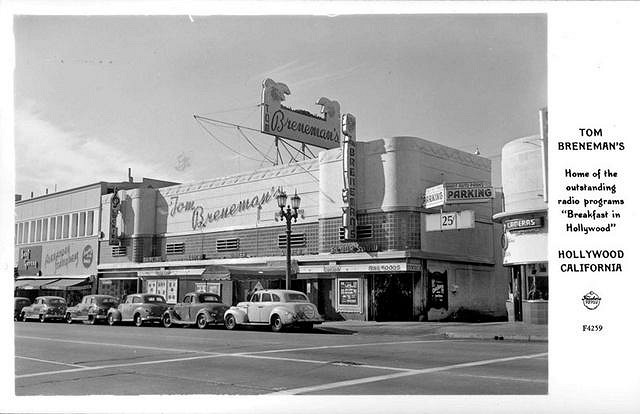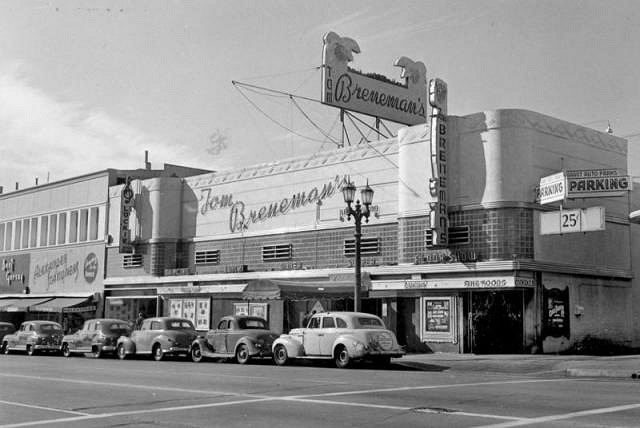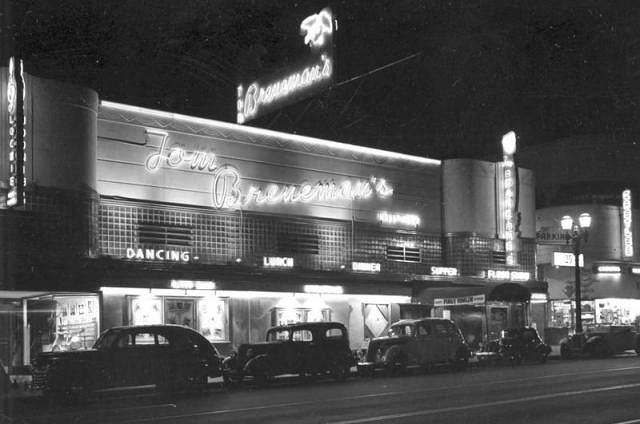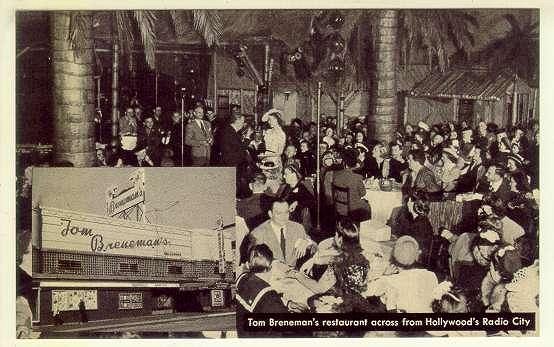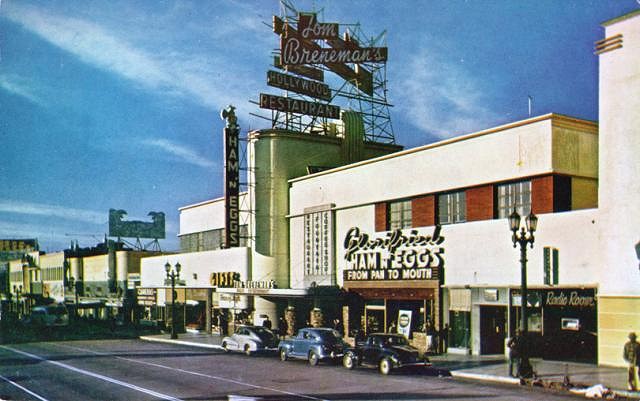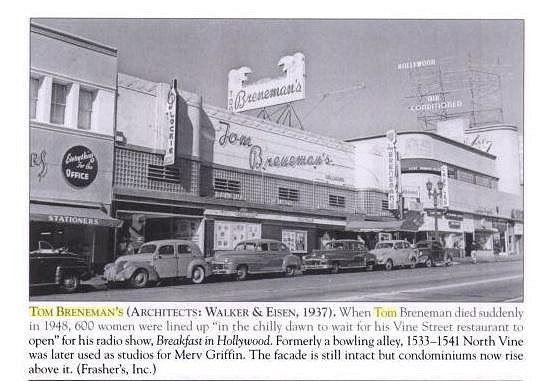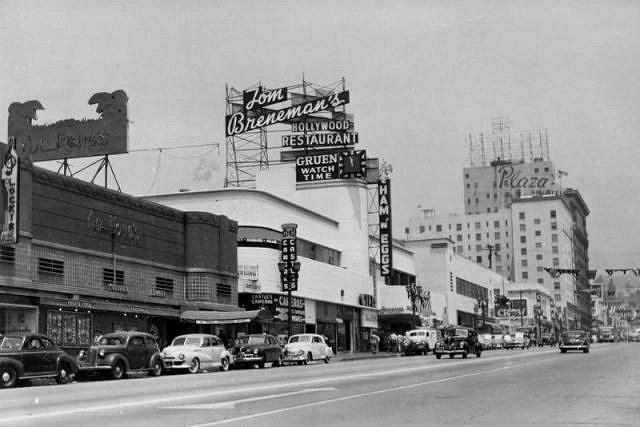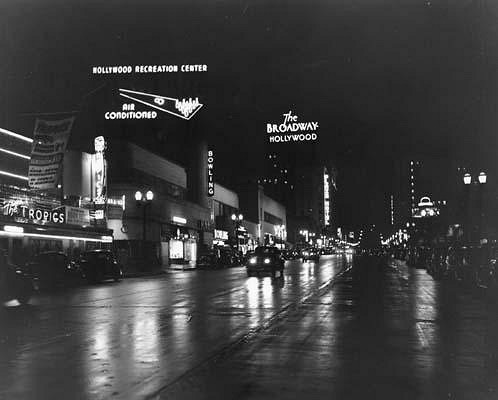Tiki Central / Locating Tiki / Tom Breneman's/Ah Fong's
Post #426412 by Tiki Shaker on Tue, Dec 30, 2008 4:28 PM
|
TS
Tiki Shaker
Posted
posted
on
Tue, Dec 30, 2008 4:28 PM
Ok.. I kind of went on a little internet adventure today. It all started with me coming across this postcard.
When I saw it, I thought the sign looked like it had a couple of palm trees. So I did some research. I found this info on wikipedia "Breakfast in Hollywood was a popular morning radio show created and hosted by Tom Breneman who broadcast from 1941 to 1948 on three different radio networks: NBC, ABC and Mutual. These unscripted shows were spontaneous and involved much audience participation. Breneman's many guests included such stars as Jimmy Durante, Andy Devine and Orson Welles. Then I came across two better pics of the outside.
I knew for sure that they were in fact palm trees. Then I found this awesome pic of the inside.
Obviously polynesian. So then I began to wonder, is this the first place he started at or is this the place he moved to and opened up his own place? I figured this was his second place, especially when I came across this.
In the background, you can see the place he ended up moving too. I had to find out what the place was before he moved there. It obviously must have been polynesian. But then I came across this.
Bowling alley? There's no way that place was a bowling alley. Maybe his first place was a bowling alley and they got the caption screwed up? Finally, I found this pic.
The title of this one has (1948) in it. So who knows. But I did look up "Ah Fong's" and found this. "Benson Fong, Character Actor and Founder of Cafes, Dies By Penelope McMillan Benson Fong, a character actor and founder of the well-known Ah Fong's restaurants in the Los Angeles area, died Saturday. He is survived by his wife, Gloria, five children and three grandchildren. Memorial services will be held at 11 a.m. Wednesday at Forest Lawn Memorial-Park, Hollywood Hills. Fong was the son of a wealthy Sacramento merchant who went broke, became ill and died during the Depression of the 1930s. Fong told interviewers that, originally, he had no thoughts of becoming either an actor or a restaurateur. In 1943, while having dinner with some friends in Sacramento, he was approached by a man from Paramount Pictures, who asked if he would like to be in a movie. Fong ended up with a role in a film called "China," starring Loretta Young and Alan Ladd. He was also offered a 10-week contract, for $250 a week. "It looked like a tremendous fortune and I accepted quickly, afraid they might think twice and back out," he told an interviewer. "I couldn't read lines too well, but World War II was under way and all the studios were looking for actors with Oriental features. I bicycled around from one set to another, playing a Japanese here, a Filipino there, a Chinese on still other days." The next year, he played one of the sons in "Charlie Chan in the Secret Service." Other films in which he appeared included "Thirty Seconds Over Tokyo" (1944); "Keys of the Kingdom" (1944); "His Majesty O'Keefe" (1954); "The Flower Drum Song" (1961); "Our Man Flint" (1965) and "The Strongest Man in the World" (1976). His chain of five restaurants, which he built up over a 30-year period, resulted from a casual remark made by actor Gregory Peck. After appearing together in "Keys of the Kingdom," Fong later recalled, Peck suggested they start a restaurant together. "The idea appealed to me," Fong said. By that time, he had met his future wife, Gloria, who was working as an actress. "We wanted to get married. But I wanted to have a predictable income, instead of becoming one more struggling actor. I decided it (the restaurant) would have to be done with my own capital, so I began saving." Two years later he had $11,000 and, in 1946, opened his first Ah Fong's on Hollywood's Vine Street. By 1971, four others had opened - on Sunset Boulevard in Hollywood, in Beverly Hills, Encino and Anaheim. The Ah in the Ah Fong's name is a term of respect in Chinese, he said. But actually, he said, he thought up the name while looking at the wrapper of an "Oh Henry!" candy bar. Fong retired from the restaurant business two years ago. At the time of his death, only the Hollywood Ah Fong's remained, owned by a relative. An avid golfer and frequent traveler to the Orient, Fong practiced meditation and once described himself as "a split personality - half a pound Oriental and eight ounces Yankee." In one interview, he said he wanted to "sum up" his life this way: "Whatever I am, spiritually speaking, is what I've wanted to be, nothing more and nothing less. Call me a happy man and you call me by my rightful name." I also found this quote from an interview with Beachbum Berry conducted by Robert Simonson. Q: How did you develop an interest in tiki drinks? A: I grew up in the San Fernando Valley in the late '60s and there were a ton of these places. My parents liked Chinese food so they would go to this place, Ah Fong. It had opened in the early '60s as the Bora Bora Room, but whoever opened it spent so much money on decor that they went broke soon after they opened. There was this guy named Benson Fong, who was a Chinese restaurant magnate back then; he would move his Cantonese crew into Polynesian places if they couldn't recoup their costs, and rename them Ah Fong. Then I also found this awesome little clip. And finally, after all of that, I decided too look up Fong's on TC and it brought me back to this awesome thread. http://www.tikicentral.com/viewtopic.php?topic=29260&forum=1 And in it, Bora Boris posted this photo.
It looks like the bigger sign was where the bowling alley was at. And perhaps before he or Fong's went into there, it was something called the tropics? I don't know, after all of this my mind is pretty boggled. update Ok... I just found this on some Hollywood and Vine history site. Here's the paragraph. "By 1945, Hollywood & Vine was the star-studded center of show business. Celebrities danced the night away at the Brown Derby, Clara Bow’s “It” Café, and Al Levy’s Tavern. They met their fans for breakfast at Tom Breneman’s restaurant, Tropics Café, from which live interviews were broadcast on national radio. Art Linkletter’s television show, People are Funny, used the corner to interview the ‘man on the street’, while Ralph Edwards and his television show, Truth or Consequences, filmed stunts along the boulevard. When World War II ended there were celebrations all over Hollywood, but it was the corner of Hollywood & Vine where the celebrations made history by shutting down the streets." [ Edited by: Tiki Shaker 2008-12-30 17:06 ] [ Edited by: Tiki Shaker 2008-12-30 17:07 ] |

